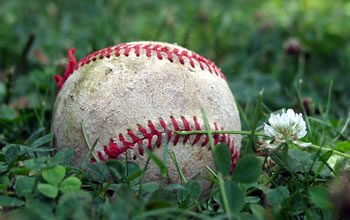
Douglas Campbell
Curveball Summer
One of the best things that ever happened to me was finding a book by Bob Feller in the town library, in January before my 12-year-old summer, my last summer of Little League. Feller was a star pitcher for the Cleveland Indians in the 1940s, and he wrote a book about how to pitch. He laid it all out: the fastball, curveball, slider, change-up. Exactly what your arm, wrist, and fingers should do. Nice drawings showing the grip for each pitch, where to put your fingers in relation to the seams of the ball. A beautiful book. I wanted a curveball in the worst way, and couldn't wait for spring to see if I could throw one.
Good thing I found Bob Feller, because the only thing my father ever taught me was what a worthless piece of shit I was. He seemed to hate everything about me, even the fact that I loved to read. He'd throw open the door to my room, see me reading on the bed. "Don't you ever get your nose out of those goddamn books?" Then he'd make that happen by rousting me out to wax his Lincoln Town Car. Not easy for me at that age, wiping stiffened wax off a car that big. It wore me out quick.
"You proud of that?" my father would say, pointing at a cloudy patch of wax still clinging to a fender. Then he'd haul off and kick me in the ass, hard. "Stop wiping like a girl, and get that wax off."
My father wasn't the only bully in my life that year. Jimmy Newsome, a pimply, fat-faced 15-year-old, decided he hated me too. When we got off the school bus he'd call me a fucking faggot, punch me in the stomach, and throw me on the ground. He was big, and it hurt. I didn't understand it then, but now I do. Some people just flick you the wrong way with how they look and act, even when you don't know them. I guess I was one of those people for Jimmy Newsome. Between Newsome and my father I lived scared, getting my butt kicked every day.
When spring came, my pal Norman and I began tossing the ball around. Things sound easy in books, but the curveball didn't come easy in real life. I gripped the ball the way Feller said, twisted my arm and wrist when I threw it, tried to get it to roll off my fingers just right. I kept asking Norman, "Did it curve?" and he kept shaking his head.
To throw a strike with a curveball you have to find just the right release point. Let go of the ball too soon, it sails high and inside. Hold on too long, you'll yank it sideways and into the ground. You have to make it spin fast too, or it won't curve, or maybe just barely curve, and that's no good. If it curves slow and lazy, like a banana, anybody can hit it. A curveball has to break sharply and suddenly. That's when batters jump away from it or swing and miss it by a foot. But to do that the ball has to be spinning fast, and I couldn't seem to make it do that.
I tried for weeks, throwing from over the top, three-quarters, sidearm, even submarine. I'd throw so long some days, jerking my arm in that curveball motion, my arm would ache from shoulder to fingertips. It frustrated me so much I was almost ready to quit baseball, and I was kid who kept baseballs on my bedside table just for their smell. New, leathery-smelling white ones, old, darkened ones smelling of grass.
One day Norman got sick of me asking him if the ball had curved, even when I knew it hadn't. "Give it up, Randy," he hollered.
Well, damn it, that flicked me the wrong way. I wanted to throw the ball through Norman's fucking head, and I flung it at him as hard as I could. Just for the hell of it I tried spinning it too. And for the first time I saw that sucker curve.
"Whoa," Norman said, "that thing broke three feet!"
I tried it again, threw it the same way, hard, with a sharp snap of the wrist. And it worked again. The ball flew off my fingers with a fast, tight spin and curved so much it scared the crap out of Norman. He jumped away from it and swiped at it with his glove, but he didn't even touch it. "You got it," he said. "Jesus!"
And I did, I had it. That's what I'd needed all along, that extra ferocity. When I got that, the curveball clicked.
Going into that summer I already understood how dangerous people are, how happy they are when they find ways to hurt you. My father taught me that, and Jimmy Newsome. But by the end of the summer I didn't care, because I didn't need other people. Learning the curveball taught me that. Anything I needed to know I could figure out for myself.
When Little League season rolled around I was unhittable. I went 9-0, and led the Flyers to the town championship. I threw my curveball right at the hitters. They'd lurch back out of the way, and the ball would break over the plate for a strike. I loved that, seeing their knees buckle, watching them stumble away from the plate, wide-eyed. Sometimes their batting helmets fell off, bounced on the dry dirt, kicked out a poof of dust. One kid spun away from a curveball, dropped his bat and helmet in the dirt, and left them lying there. He walked to the bench, to his coach, with tears rolling down his cheeks.
That was the best moment of the summer. The little jerk was scared to death of me.
©2009 by Douglas Campbell


